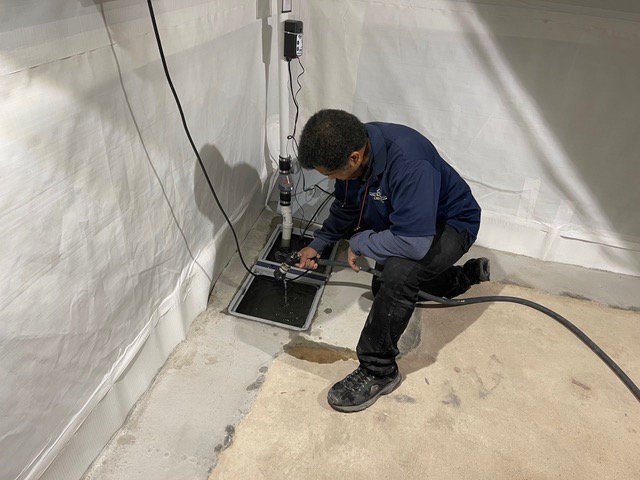- August 30, 2023
- Posted by:
- Category: Basement Questions

Basement leaks can swiftly escalate from minor nuisances to major structural concerns if left unattended. In the realm of home maintenance, understanding the five common causes of basement leaks is crucial for preemptive action. This article delves into these key factors and provides essential insights into effective repair strategies, ensuring a dry and secure foundation for your home.
1. In a basement, everything starts with owning a Dehumidifier.
Why: The dehumidifier should be a self-draining type of unit that should be located near a sump basin. If a sump pump does not exist, a unit can be purchased with a condensate pump for easy draining through any of the basement walls or the closest drain. A dehumidifier will keep the basement dry at all times, which helps prevent basement leaks repair being needed.
2. Keep grass, mulch, and debris below the foundation wall approximately 4 to 6 inches.
Why: If the surface is too close to the bottom of the foundation wall, it will easily allow water to flow over the sill plate, through a vent, or around a pipe penetration. It will greatly reduce the basement flooding repairs needed in the future.
3. Make sure all wall ties are cut off and filled with waterproof grout, prior to waterproofing the basement walls.
Why: The tie holes actually pass through both sides of the wall with a steel rod that will easily rust and cause chipping, cracking, and breaking around the entry point. Consider there could be in some cases hundreds, of these pins that never have been removed creating the first basement leak repair needed.
4. When choosing the type of waterproofing to use, consider the soil type around the basement.
Why: Different soils can play a major factor in how effective the materials are or in some cases how difficult it will be to apply or in many cases re-apply when making repairs. Try using a permanent type of product like Kryton’s T1. Crystalline types of waterproofing can last as long as the home in many cases. Preventing the need to re-waterproof the walls every 10 or 15 years. Krytons products get stronger over time while other manufacturers’ products get weaker over time. To choose the best product for your application simply contact a Basement repair specialist near you.
5. Hire a basement company to do annual service on your pumps, backups, and dehumidifiers and check all your plumbing connections for leaks
Why: Regular maintenance prevents hardware failures, and early detection of leaks preventing major issues later like basement wall repair, mold remediation, and in some cases basement flooding.
In conclusion, safeguarding your home against basement leaks requires a comprehensive grasp of the underlying culprits and adept repair techniques. By addressing issues such as poor drainage, foundation cracks, and faulty sealing, you can prevent moisture from undermining your home’s integrity. Timely and diligent repair efforts will not only thwart potential damage but also provide a solid foundation for a secure and comfortable living environment.
